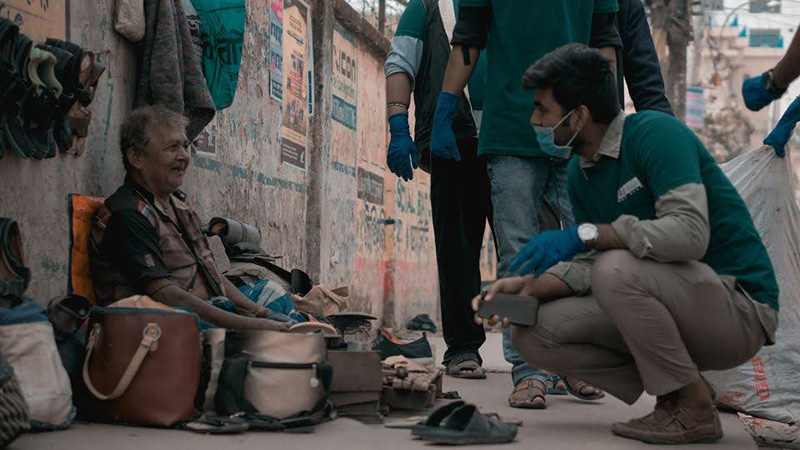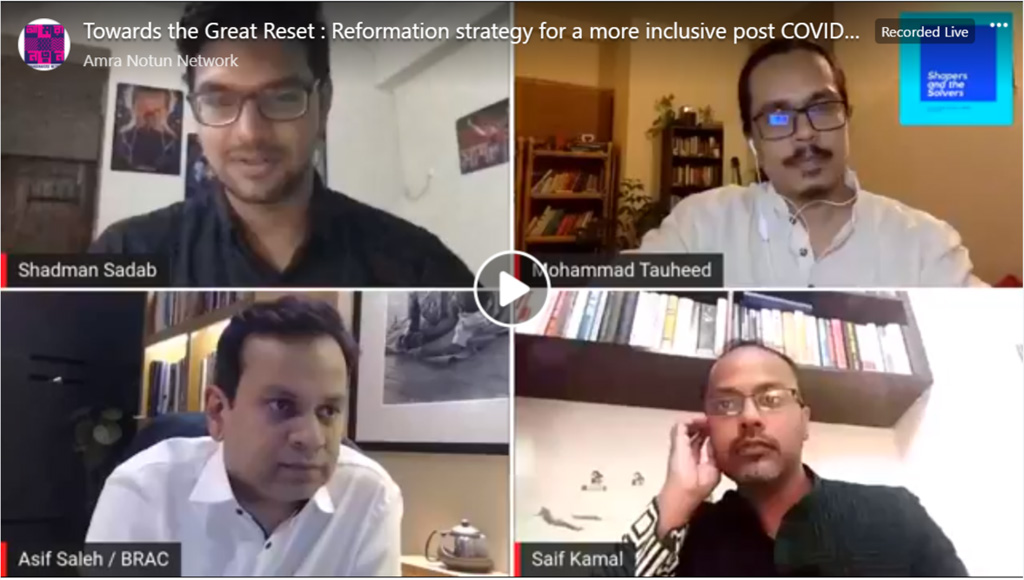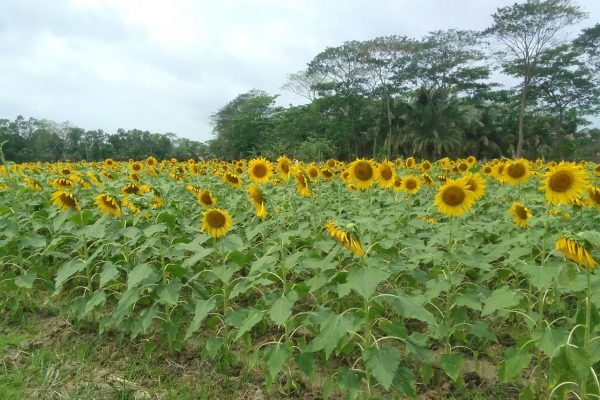Reading Time: 3 minutes
Nearly six months into the global Covid-19 crisis, the fight is far from over. It is now high time to reset, reboot, and consider our reformation strategy going forward, both nationally and internationally.
Global Shapers Dhaka Hub of the World Economic Forum and Amra Notun Network of BRAC Youth Platform launched the webinar series Shapers and the Solvers, with The Daily Star as the media partner, and Torun Digital as the youth outreach partner.
Taking lessons from top practitioners, the first webinar of the series kicked off on 22 September 2020 with “Towards the Great Reset: Reformation Strategy for a more inclusive post-COVID-19 world”. Thousands of viewers tuned in as host Shadman Sadab, Global Shaper of Dhaka Hub, welcomed insights from the speakers: Asif Saleh, executive director of BRAC; Saif Kamal, founder of TORU Institute; and Mohammad Tauheed, founding curator of the Global Shapers Dhaka Hub.
As the speakers discussed the impact of COVID-19 on global development, especially on people living at the bottom of the pyramid, suggestions highlighted the role of “youth” and “innovation”, while rethinking policies, employment and settlements. Here are four ruminations from the session:
Mind the gap: Pockets of unmet needs
‘The great reset’, a term popularised by the World Economic Forum to characterise the particular time we are living through as a wake-up call for world leaders, must focus on social and economic recovery plans. Bangladesh as well as African countries may not be facing a tremendous surge of COVID-19 cases as forecasted, but instead are burdened with collapsing economies and education sectors. With rising job cuts and reverse migration happening as a result, an astounding number of people have become part of the “new poor”.
Despite commendable efforts of the Government of Bangladesh in providing allowances and stimulus packages since April, there remain gaps in reaching the urban poor and middle-income households. While rickshaw-pullers may not be starving, they are most likely skipping meals; sex workers in Jashore have been rendered destitute. To prevent further marginalisation of the already marginalised population, Asif Saleh suggested accounting for these pockets of sectors within inclusive recovery strategies.
Employment: Closed windows of opportunities
Very few organisations are hiring while startups are downsizing. Supporting entrepreneurs in small and micro businesses can help generate employment. Social entrepreneurs can work on ventures to serve dual purposes, looking at people living in the margins as both consumers and producers. This way society benefits as a whole, while businesses continue making profits.
New jobs are opening up in the health and digital sectors. The public and private health sectors are also hiring professionals like nurses and lab technicians. In light of these opportunities and the digital transformation brought on by the pandemic, it is crucial to reskill, especially with digital skills.
Digital love: When crisis leads to revolution
COVID-19 has spearheaded a digital transformation. With limitations on physical movement, people have adapted to new technology such as mobile money faster than ever before. Digital platforms have also given a broader audience access to education, skills-based training and career guidance. Coaching centres in Bangladesh are allowing students to prepare for BCS and university admissions examinations without the need to travel to Dhaka.
While technology can lead with highly effective, impactful solutions at low cost, Saif Kamal, founder of TORU Institute pointed out that it cannot solve all our problems. Ensuring nationwide quality broadband, along with free access to those who can’t afford it, are crucial to avert a digital divide. The private sector can pervade this space, with flexibility within public policies. With these steps in mind, these new dimensions of change can further encourage people to pursue newer routes of innovation.

A volunteer of BRAC Youth Platform engaging with local hawkers, many of who may not have the information they need to protect themselves.
Young folks, may the force be with you
The large population of young Bangladeshi people is a force to be reckoned with. However, there is much need for intergenerational dialogue between the energetic youth and the experienced policy makers, to ensure young people are included in decision-making. To ensure diverse representation, it is also important to open up opportunities to randomness. Mohammed Tauheed emphasised that from the hiring process to arranging webinar discussions, we need to reach beyond our social bubbles.
The youth can further channel their potential into serving the needs within their local communities. One such example is the Community Support Team (CST) initiative, designed under the leadership of the Directorate General of Health Services (DGHS) in partnership with multiple organisations, including BRAC. The CST consists of dedicated young volunteers, some of whom are part of the Young Responders’ Troop under the BRAC Youth Platform, who ensure patients affected by COVID-19 within their areas receive all necessary support.
In the end, not everyone needs to do everything. In times of national crises, Bangladeshis have always responded with whatever tools they have. By equipping a pool of force multipliers to become a hundred Sheikh Mujibs or Jahanara Imams, we can make large-scale impact and build a safer post-COVID world – one that works for everyone.
Anika Haque: Anika Haque is the deputy manager of communication and alumni engagement at BRAC Youth Platform.
Shadman Sadab: Shadman Sadab is a global shaper of World Economic Forum (representing Dhaka Hub) and director of Good City Foundation.






